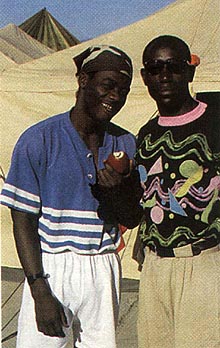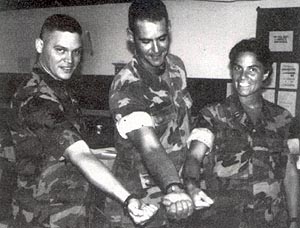|
What
did the refugees think about being tagged?
How would you feel about wearing a microchip with an
ID number? Would you feel like you were being treated
as a number not an individual person? Or would you feel
that you were part of a system that could help you?
The
refugees in the camp at Guantanamo Bay reacted in many
different ways. Some thought the microchips were too
impersonal. They wanted ID cards with a photo instead,
to make sure they were always treated as people, and
not just numbers.
Others
just thought the wristbands were uncomfortable.
|
Work
of the devil
Some refugees were much more upset and worried.
Some believed that the wristbands were the work
of the devil. In the Christian Bible, in the book
of Revelations, it says that the beast will put
a mark on everyone's right hand, and the mark
might be a number. Some refugees thought their
wristbands fulfilled this prophecy.
Some
people cut their wristbands off or chewed through
them.
Symbol
of hope
Other refugees had a completely different idea.
They were very happy about the wristbands because
they felt it meant the United States authorities
were taking their applications for political asylum
seriously. Some also felt the wristbands were
a mark of solidarity between the refugees who
were sharing a dramatic experience.
But
many refugees didn't care so much one way or the
other, they just accepted the wristbands as part
of the process. "We have to wear it to get
medical help at the hospital, and I have an injury"
one woman said. "It's OK."
|

Lyonel and David are brothers
from Haiti. "When they put this on me,
man, I knew they were taking me seriously"
Lyonel said. David agreed: "When I saw
my name and picture in that computer, I knew
things were going to be fine." Photo:
Lynne Brakeman |
|
Microchips
for United States personnel
To reassure the refugees, and help them get used to
the idea of wearing the microchip wristbands, some of
the United States service personnel started wearing
the wristbands too. Some personnel put the wristbands
on to show that it didn't hurt when the ends of the
band were riveted together around someone's wrist. Others
just wanted to reassure the refugees that wearing the
wristband was OK, and they were still being treated
as people.

United States staff show off the
wristbands they wore to show the refugees they cared
about them. Photo: Lynne Brakeman.
|
Some
of the United States personnel originally came from
Haiti. Joseph Pierre-Louise migrated to the USA when
he was a child, and later joined the US Marines. He
was sent to the US Naval Base at Guantanamo Bay to work
as a guard and interpreter, but at first the Haitian
refugees wouldn't trust him. "They told me I wasn't
their brother because I wasn't wearing the wristband."
He asked to wear one himself, and after that the refugees
accepted him.
Click
here to read more about what people thought of being
tagged in RF/ID bracelet as myth and symbol.
|